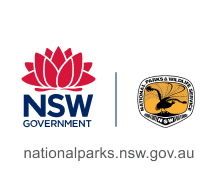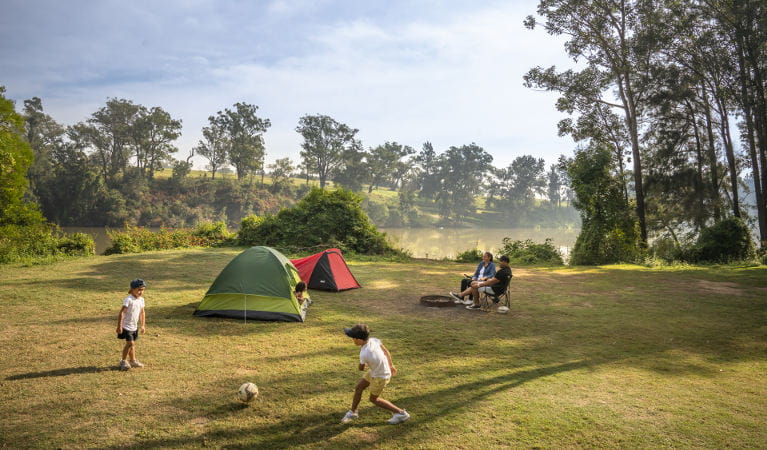Cattai campground
Cattai National Park
Overview
Enjoy a weekend away camping at Cattai National Park along the Hawkesbury River. Go walking, camping, canoeing and bike riding before cooking up a barbecue feast.
| Camping type | Tent, Camper trailer site, Caravan site, Camping beside my vehicle |
|---|---|
| Facilities | Amenities block, barbecue facilities, showers, toilets |
| What to bring | Drinking water, cooking water, firewood, camping equipment, tent |
| Opening times | Cattai National Park is locked overnight, including the campground. An emergency after-hours gate code will be included in your booking confirmation. The entry gate opens at 8am and is locked at 5pm (May to September) or 8pm (October to April). |
| Entry fees |
Park entry fees are not included in your camping fees. |
| Group bookings | Bookings for up to 5 sites and 20 people can be made online. School groups and commercial tour operators can submit a group booking enquiry form. |
| Please note |
|
Cattai campground is a great place for a weekend getaway with family or friends and a good place to stop with your campervan on a driving tour.
Once you’ve picked the perfect campsite and pitched your tent, it’s time to start exploring. Kids will love the wide open space that is great for bike riding, playing and running, plus the campground is right near the Hawkesbury River, meaning fishing, canoeing and kayaking opportunities are all nearby. There’s also the historic Cattai Homestead, a short walk or drive from campground. It’s an important part of Australian history so be sure to check it out.
You’ll probably be woken by the call of birds in the morning, and you may see a kangaroo peeking at you through the bushland on a morning walk to the lookout over Hawkesbury River.
Also see
-

Cattai picnic area
Ideal for a picnic or barbecue, Cattai picnic area is located close to historic sites on the Hawkesbury River banks. Visit for birdwatching and paddling.
-

Cattai Homestead and historic farm buildings
Cattai Homestead and historic farm buildings near Windsor, just north of Sydney, are an important part of Australian history and a must-see for history buffs.
Map
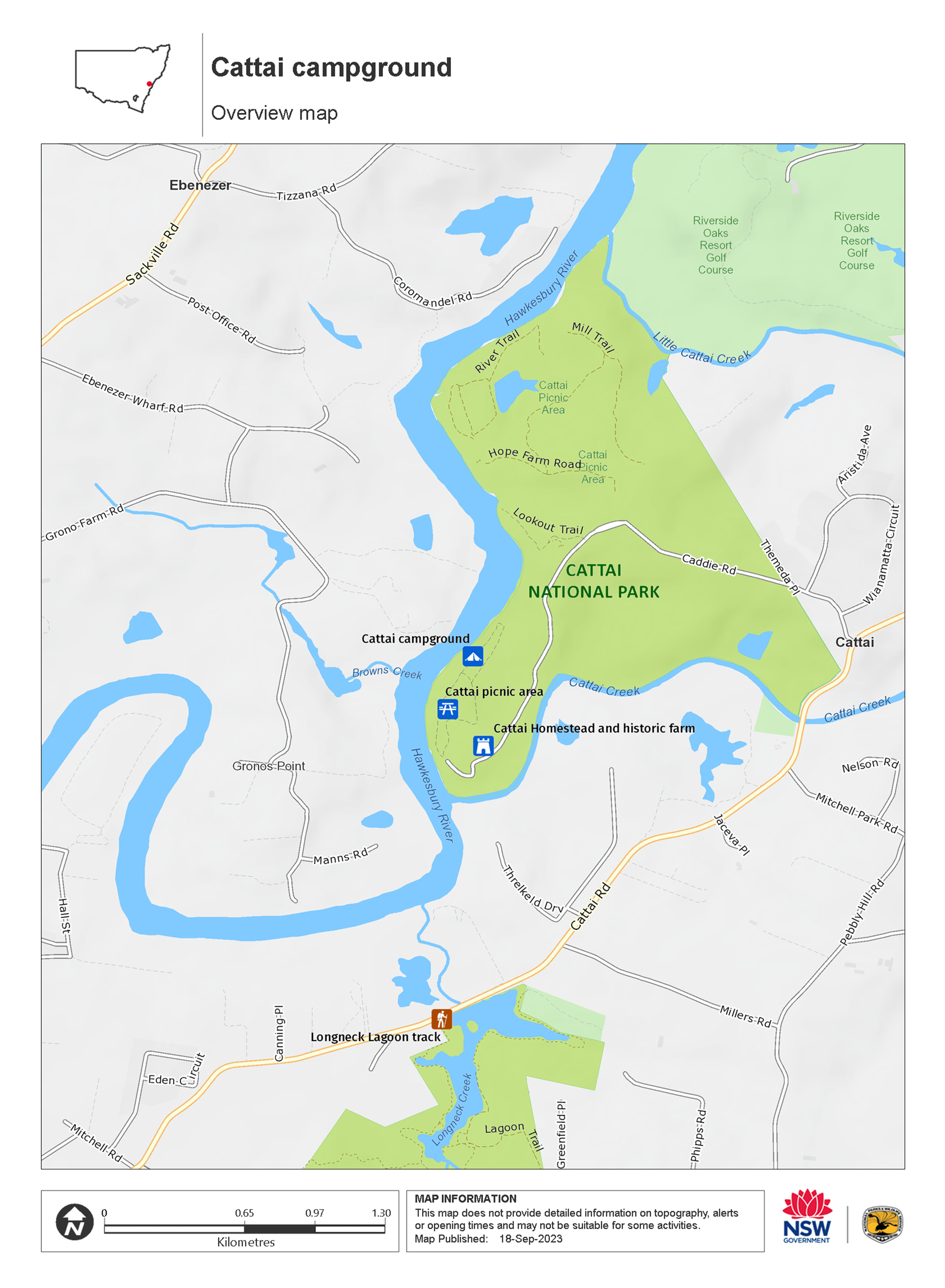
Map legend
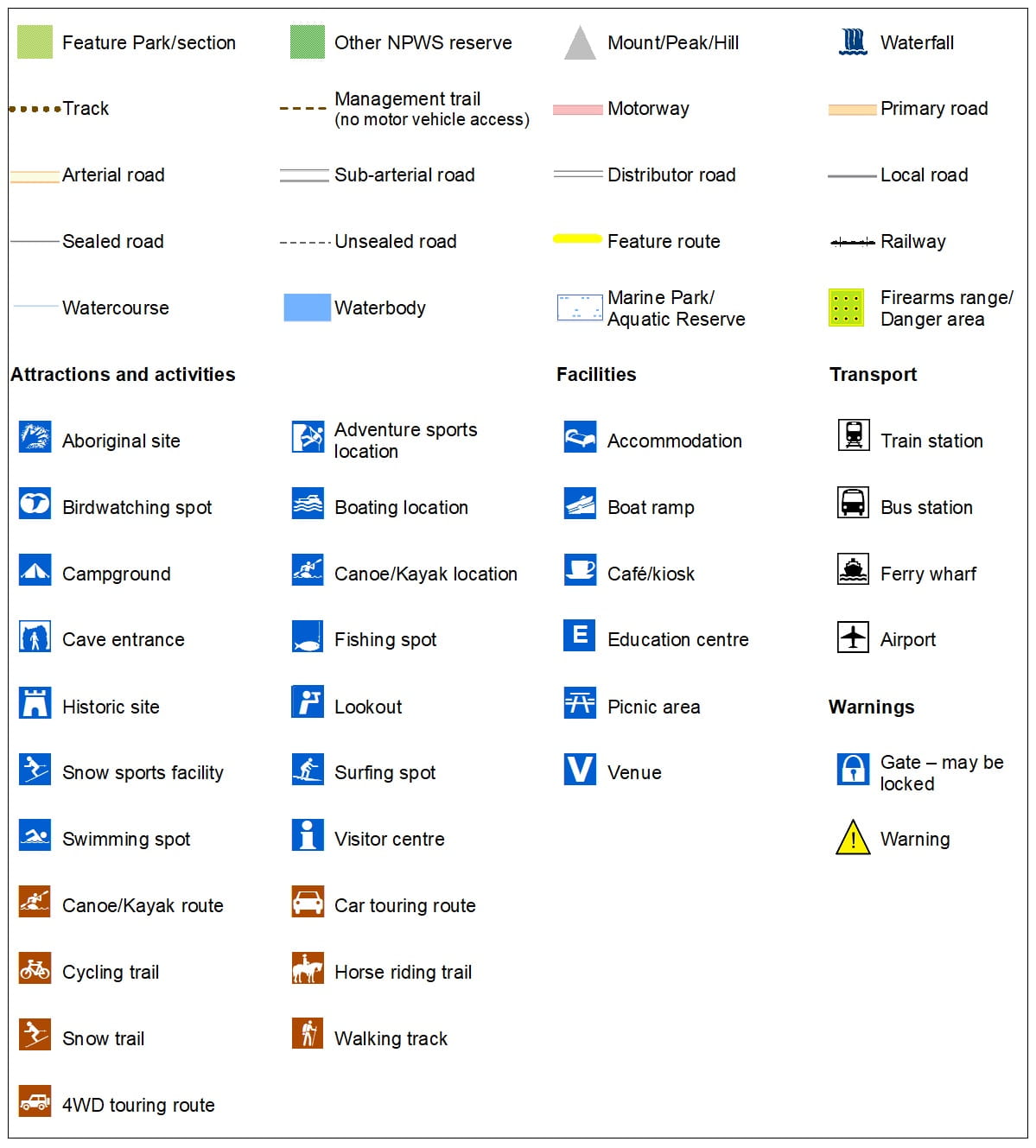
Local alerts
For the latest updates on fires, closures and other alerts in this area, see https://www.nationalparks.nsw.gov.au/camping-and-accommodation/campgrounds/cattai-campground/local-alerts
Bookings
- National Parks Contact Centre
- 7am to 7pm daily
- 1300 072 757 (13000 PARKS) for the cost of a local call within Australia excluding mobiles
- parks.info@environment.nsw.gov.au
Park info
- in Cattai National Park in the Sydney and surrounds region
Cattai National Park is open 8am to 6pm from May to August and 8am to 8pm from September to April. The park may have to close at times due to poor weather or fire danger.
-
Park entry fees:
$8 per vehicle per day (including motorbikes). Day passes are available from on-park pay machines that accept coins and credit cards, and you can also pay for your visit via the Park’nPay app.
Buy annual pass
Visitor info
All the practical information you need to know about Cattai campground.
Getting there and parking
Cattai campground is located in Cattai National Park. To get there, take Wisemans Ferry Road, Cattai and look for the turn off at Caddie Road. Follow the signs to the campground.
Access to the campground is along both sealed and unsealed road sections accessible by 2WD vehicles. Camping is only permitted in the campground which is at the far end of the main picnic area.
Road quality
- Mixture of sealed and unsealed roads
Vehicle access
- 2WD vehicles
Weather restrictions
- All weather
Parking
Parking is available in the campground.
Best times to visit
Cattai National Park is a great place to visit all year round. Head to the park for a winter picnic in the sun or a family camping holiday during spring. Walking and bike riding are popular autumn activities in the park and summer is perfect for boating and paddling along the river.
Weather, temperature and rainfall
Summer temperature
Average
16°C and 30°C
Highest recorded
42.5°C
Winter temperature
Average
3°C and 18°C
Lowest recorded
-7.2°C
Rainfall
Wettest month
January
Driest month
September
The area’s highest recorded rainfall in one day
309.4mm
Facilities
- Campsites are unmarked and suitable for tents, camper trailers, campervans and caravans.
- The campground has a maximum occupancy of 200 campers.
- The water available at Cattai campground needs to be treated before drinking.
- There is no power in the campground.
- Please take all rubbish with you when you leave.
- There are no boat launching facilities in this park.
Amenities
There's a camp kitchen with barbecues and washing up facilities.
Toilets
- Flush toilets
Barbecue facilities
Fires are allowed in designated barbecues or portable off-the-ground barbecues.
- Wood barbecues (bring your own firewood)
Showers
- Hot showers
Maps and downloads
Accessibility
Disability access level - medium
- Assistance may be required to access this area
- The campground is mostly flat, with grass and gravel terrain, making it moderately wheelchair-accessible.
- There is an accessible toilet at the main amenities block.
Prohibited
- Don't empty chemical toilets into campground amenities.
- Don't empty caravan grey water into the ground.
Gathering firewood
Chainsaws are not permitted
Generators
Pets
Pets and domestic animals (other than certified assistance animals) are not permitted. Find out which regional parks allow dog walking and see the pets in parks policy for more information.
Smoking
NSW national parks are no smoking areas.
Learn more
Cattai campground is in Cattai National Park. Here are just some of the reasons why this park is special:
A birder's bounty
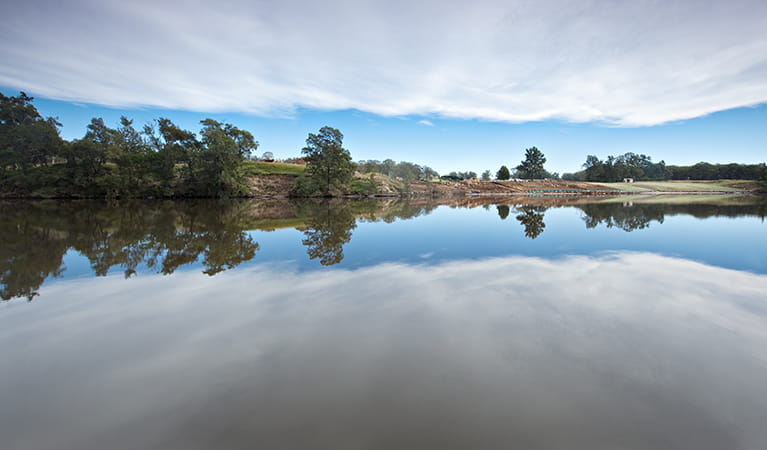
The park's riverside location, close to Longneck Lagoon, makes it popular with birdwatchers. Spot vulnerable black bitterns, powerful owls or rufous night herons. Visit the park's major wetland areas to observe several bird species otherwise scarce within Sydney.
- Mitchell Park walking tracks Mitchell Park walking tracks offer several linked walks through remnant rainforest, diverse woodland and wetlands, in Cattai National Park, near Windsor.
Aboriginal culture
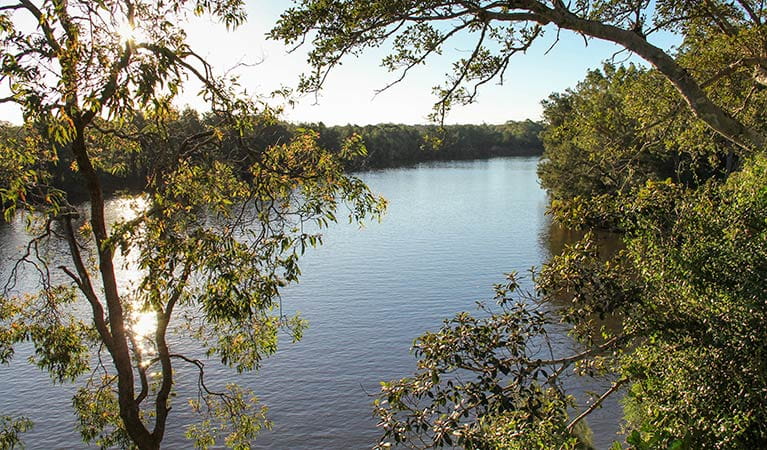
Cattai National Park is the traditional Country of the Darug people. The park's landscape, including the river provided a rich source of food, medicine, shelter and tools for the Aboriginal people who travelled through the area. The park protects a number of ancient Aboriginal sites that are evidence of the Darug people's ancient connection to the land, you may find axe grinding grooves on rocks as well as rock engravings and art.
An important landscape
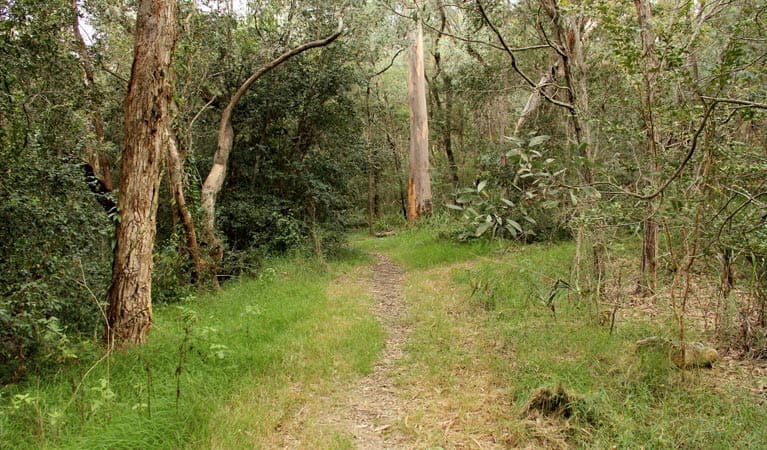
Cattai National Park lies within the Cumberland Plain, an important land system near Sydney that has been impacted by agricultural processes and urban development. Mitchell Park is significant because it contains much of its original vegetation, including paper bark, red gum, stringy bark, grey gum and cabbage gums. The best way to see the changing vegetation is along the Mitchell Park track, you'll notice that each part of the walk is named to describe the type of vegetation along that part of the walk.
Colonial history
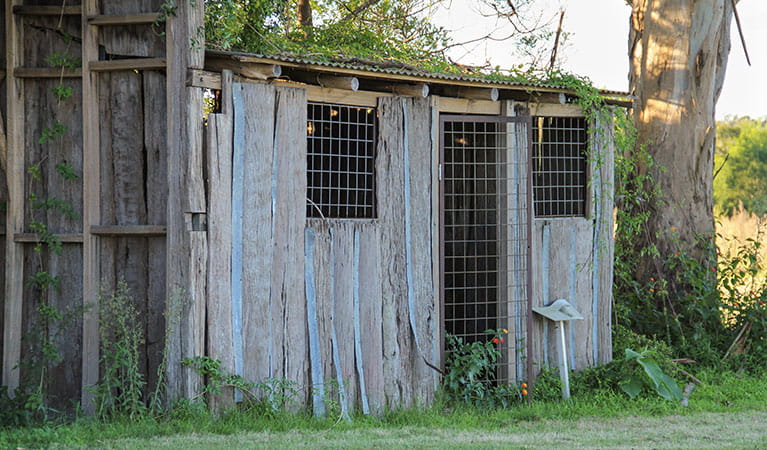
Cattai National Park is significant because it includes a parcel of land granted to First Fleet assistant surgeon Thomas Arndell. Cattai Farm and the surrounding area was home to seven generations of Arndell's, with the land remaining with descendents of Thomas Arndell for about 180 years. Today, several historic sites invite observation and journeying into the past; Arndell's 1821 homestead, convict-built walls and roads, grain silos and ruins of a windmill believed to be Australia's oldest industrial building.
- Cattai Homestead and historic farm buildings Cattai Homestead and historic farm buildings near Windsor, just north of Sydney, are an important part of Australian history and a must-see for history buffs.
Plants and animals protected in this park
Animals
-
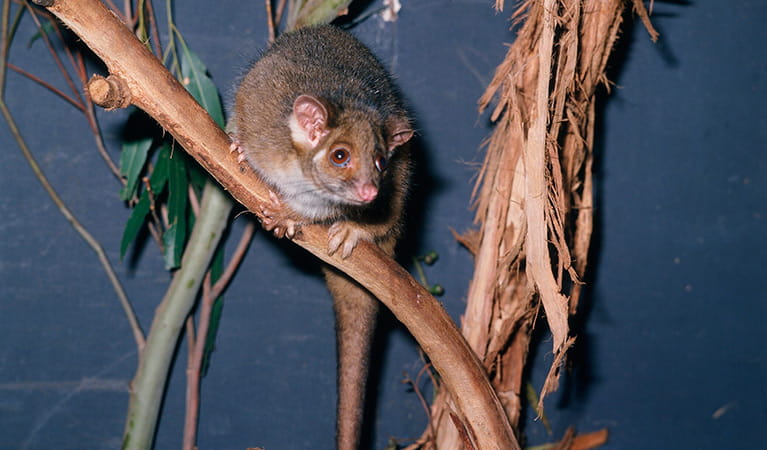
Common ringtail possum (Pseudocheirus peregrinus)
Commonly found in forests, woodlands and leafy gardens across eastern NSW, the Australian ringtail possum is a tree-dwelling marsupial. With a powerful tail perfectly adapted to grasp objects, it forages in trees for eucalypt leaves, flowers and fruit.
-
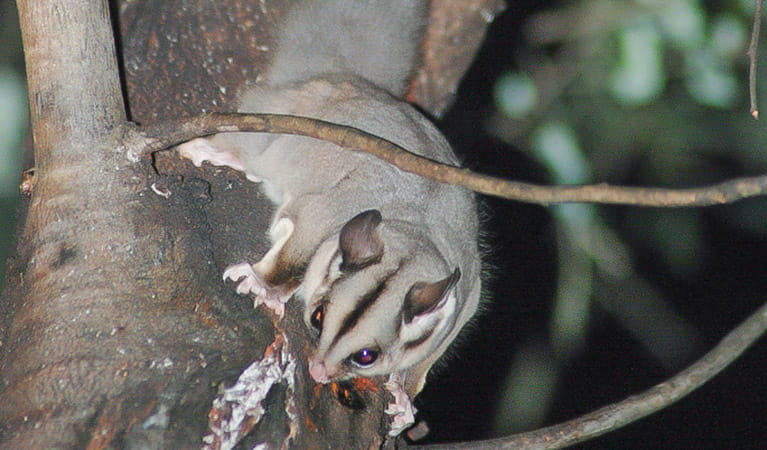
Sugar glider (Petaurus breviceps)
The sugar glider is a tree-dwelling Australian native marsupial, found in tall eucalypt forests and woodlands along eastern NSW. The nocturnal sugar glider feeds on insects and birds, and satisfies its sweet tooth with nectar and pollens.
-
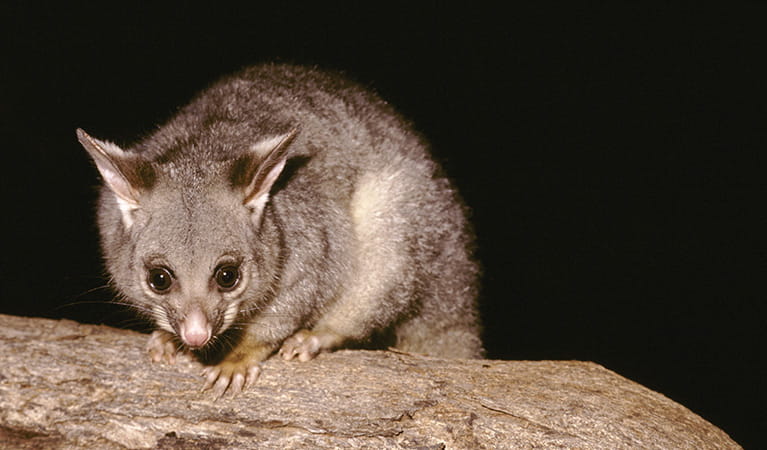
Common brushtail possum (Trichosurus vulpecula)
One of the most widespread of Australian tree-dwelling marsupials, the common brushtail possum is found across most of NSW in woodlands, rainforests and urban areas. With strong claws, a prehensile tail and opposable digits, these native Australian animals are well-adapted for life amongst the trees.
-
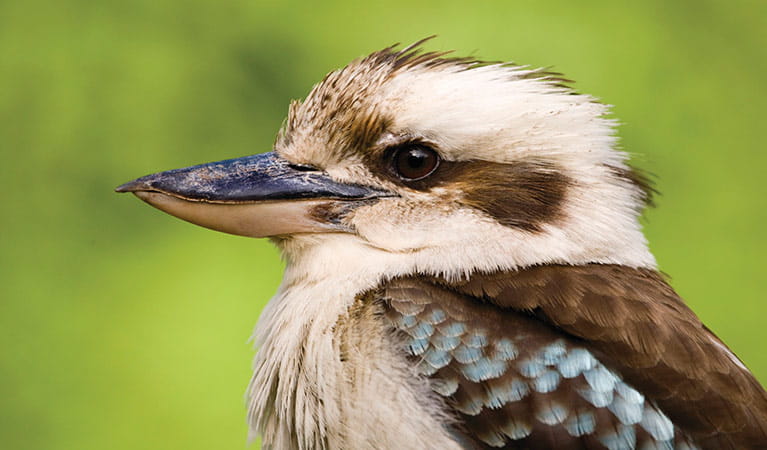
Kookaburra (Dacelo novaeguineae)
Of the 2 species of kookaburra found in Australia, the laughing kookaburra is the best-known and the largest of the native kingfishers. With its distinctive riotous call, the laughing kookaburra is commonly heard in open woodlands and forests throughout NSW national parks, making these ideal spots for bird watching.
-
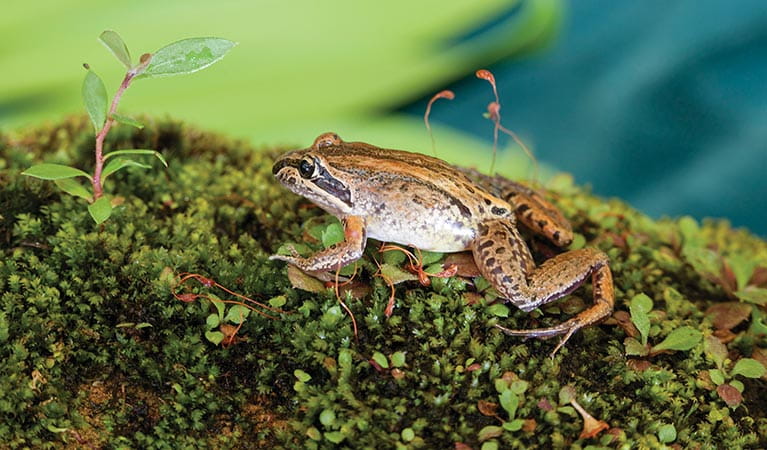
Brown-striped frog (Lymnastes peronii)
One of the most common frogs found in Australia, the ground-dwelling brown-striped frog lives in ponds, dams and swamps along the east coast. Also known as the striped marsh frog, this amphibian grows to 6.5cm across and has a distinctive ‘tok’ call that can be heard all year round.
-
Cumberland Plain land snail (Meridolum corneovirens)
The endangered Cumberland Plain land snail is only found on the Cumberland Plain, west of Sydney. During drought it digs deep into the soil to escape harsh conditions. Its brown shell is thin and fragile.
Environments in this park
Education resources (1)
Bookings
- National Parks Contact Centre
- 7am to 7pm daily
- 1300 072 757 (13000 PARKS) for the cost of a local call within Australia excluding mobiles
- parks.info@environment.nsw.gov.au
Park info
- in Cattai National Park in the Sydney and surrounds region
Cattai National Park is open 8am to 6pm from May to August and 8am to 8pm from September to April. The park may have to close at times due to poor weather or fire danger.
-
Park entry fees:
$8 per vehicle per day (including motorbikes). Day passes are available from on-park pay machines that accept coins and credit cards, and you can also pay for your visit via the Park’nPay app.
Buy annual pass
What's nearby:
Things to do (87)
- Aboriginal culture (8)
- Adventure sports (2)
- Beach (2)
- Birdwatching and wildlife encounters (17)
- Canoeing/paddling (5)
- Cultural heritage (3)
- Cycling (9)
- Environmental appreciation/study (3)
- Fishing (3)
- Historic heritage (19)
- Horse riding (3)
- Other experiences (5)
- Picnics and barbecues (14)
- Road trips and car/bus tours (1)
- Sailing, boating and cruises (5)
- Sightseeing (19)
- Visitor centres (2)
- Walking (49)
- Wildflowers (seasonal) (7)
